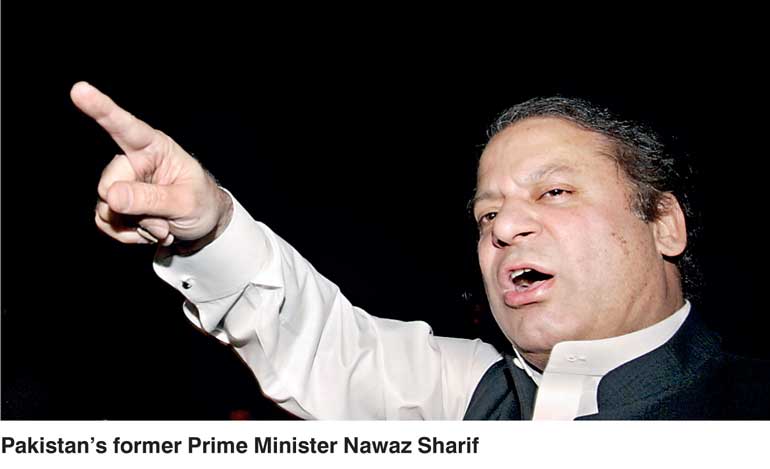Saturday Feb 14, 2026
Saturday Feb 14, 2026
Tuesday, 1 August 2017 00:03 - - {{hitsCtrl.values.hits}}
 Last week, Nawaz Sharif stepped down as Prime Minister of Pakistan following a unanimous decision made by a five-member bench of the country’s Supreme Court.
Last week, Nawaz Sharif stepped down as Prime Minister of Pakistan following a unanimous decision made by a five-member bench of the country’s Supreme Court.
The Supreme Court held that Sharif had been dishonest by not disclosing his earnings received from a Dubai-based company in his nomination papers for the 2013 general election. Following the 2015 ‘Panama papers’ revelations, which disclosed some offshore assets belonged to Sharif’s children, this probe was carried out into the wealth of the Sharif family.
Justice Ejaz Afzal Khan, in his summing up, said that Prime Minister Sharif was no longer eligible to be an honest member of the parliament.
Further, the Supreme Court of Pakistan determined and recommended anti-corruption prosecution against several individuals. They included; Nawaz Sharif himself, his daughter Maryam, his son-in-law Safdar, Finance Minister Ishaq Dar and some others.
The writer believes that this sets an appropriate and timely example for Sri Lanka as well!
José Ugaz, Chair of Transparency International (TI) said: “In too many countries, people are deprived of their most basic needs and go to bed hungry every night because of corruption, while the powerful and corrupt enjoy lavish lifestyles with impunity.” This is where we stand right now, unfortunately!
According to Corruption Perception Index (2016) of TI Pakistan and Sri Lanka were ranked 116th & 95th (scored 36 points out of 100) respectively (1st Denmark and New Zealand being the least corrupt countries out of 176). On the surface, Sri Lanka looked better relatively, but we all know where we stand.
Now, before going any further, we must examine how the law works in practical terms in Sri Lanka and Pakistan for the wrongdoers of this nature.
A few days ago, we saw a former Deputy Minister Sarana Gunewardena pleading guilty for failing to declare his assets and liabilities from 2005-2007. The judge just fined him 2m000 bucks ($ 13)! The writer believes that this was just what has been allowed by the law and judge’s hands were tied.
In the case of Pakistan, we saw a politician declared; ‘dishonest and not fit to be in Parliament’ for a similar violation of law that the former Deputy Minister Gunewardena committed.
The writer (a layman on law) begins to think that not declaring assets in time, pleading guilty and paying a peanut fine could be much better in monetary terms for the rogues, compared with a situation of declaring assets before and getting caught for illegally acquired wealth, at the end of the tenure!
On the other hand, every day, we hear about the investigations and court cases that are pending against the politicians and officials of the former regime. Also, we now hear some revelations taking place at Presidential Commissions about some politicians in office. All of them should be taken to task, of course on proper grounds, irrespective of their positions, connections or colours, for the sake of the country.
So, where does Sri Lanka stand? The writer believes that Sri Lanka is no better (compared with Pakistan), in terms of corruption, irrespective of the TI index, in real fact! While the authorities do their best to punish the culprits according to the existing laws, we need a complete overhaul on our legal system urgently!
The new set of laws should be contemporary, far-sighted, practical, empathetic (on the right people), versatile, enforceable, durable and simple in order to bring justice, equality and fair-play to all our citizens equally.
(The writer is a borderless thinker and futurist. His email is [email protected])